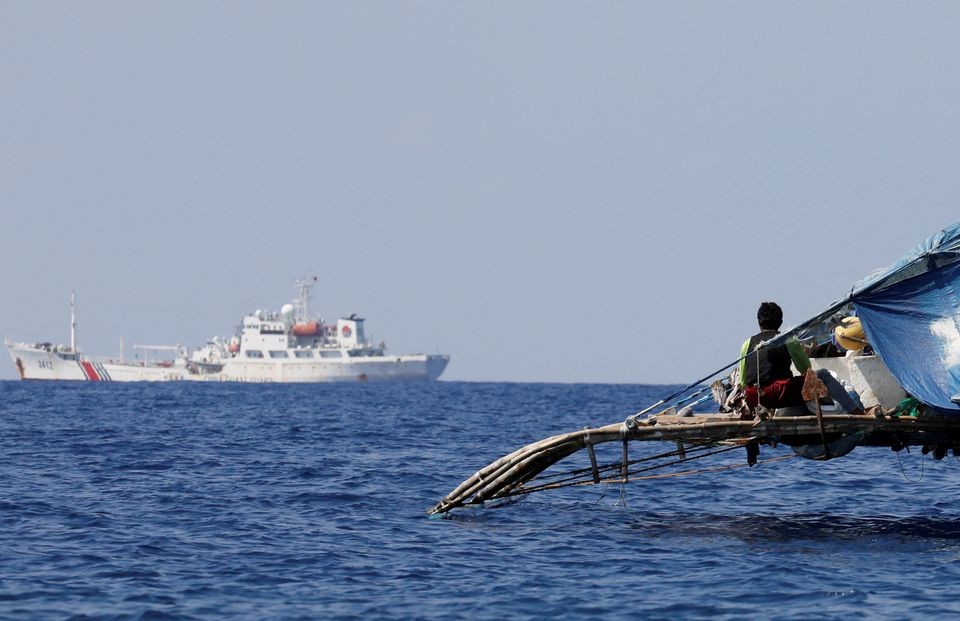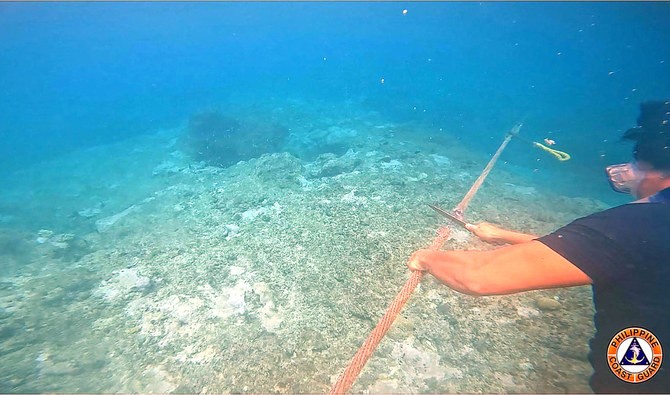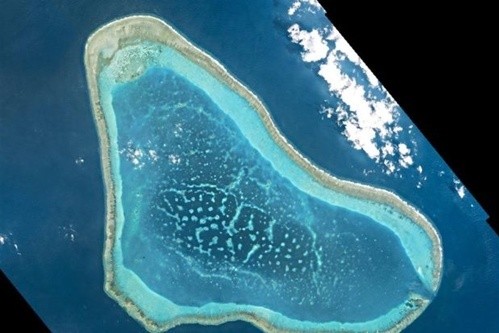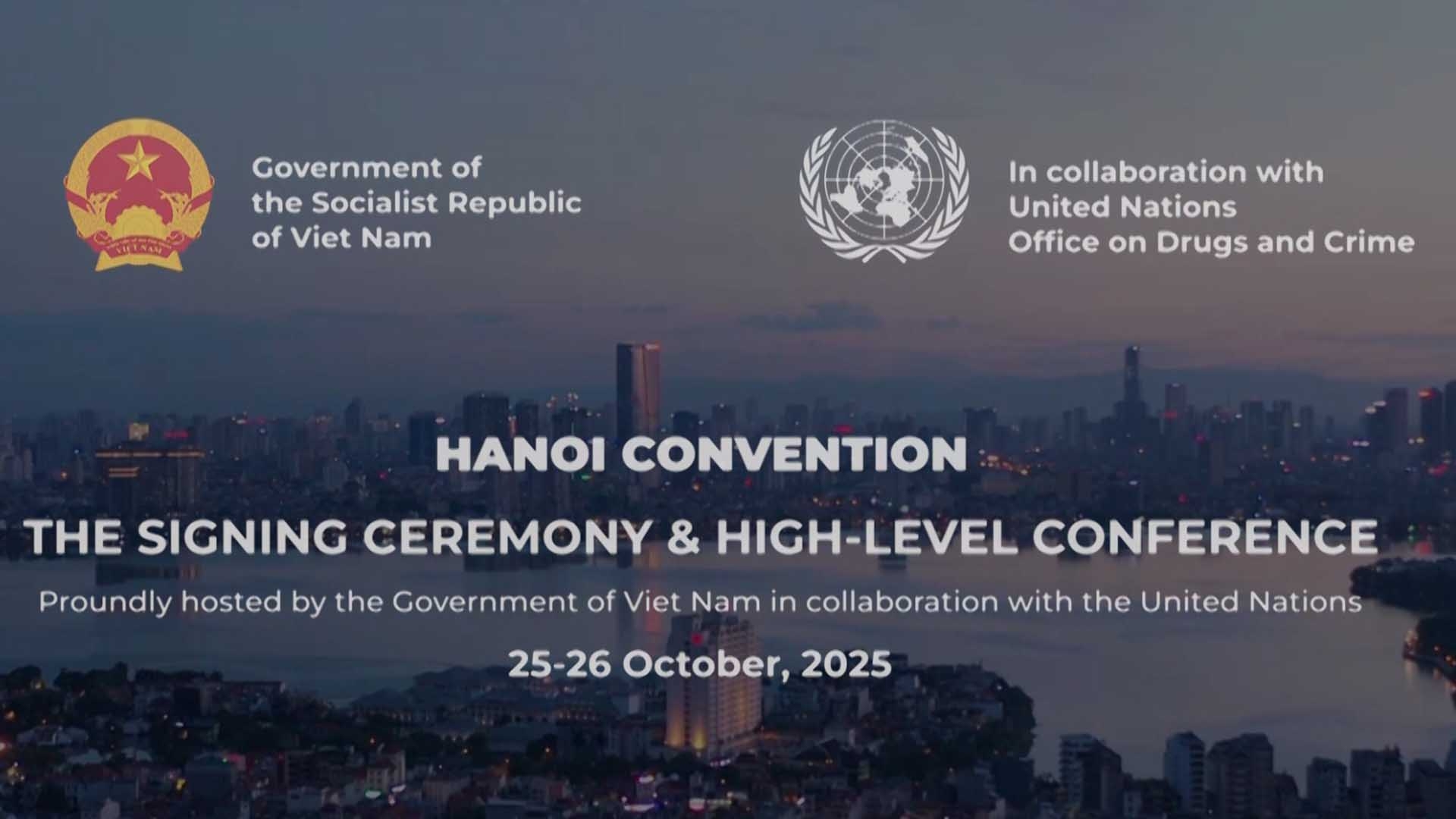
Scarborough Shoal sovereignty dispute from an international perspective and implications
Latest
In regional and international forums, the Eastern Sea has been considered a "hotspot" with latent tensions and conflicts that could erupt if parties involved do not exercise restraint. Despite differing viewpoints and levels of expression, this is an undeniable reality, as recent developments around Scarborough Shoal (known as Hoang Nham in China’s terms) have demonstrated.
Historical background
To understand the current situation, it is necessary to go back more than 10 years. In 2012, China gained control of Scarborough Shoal after more than 2 months of tense confrontation at sea with the Philippines. Since then, China has regularly deployed forces, implemented various measures such as laser beams, water cannon discharges, obstructing Filipino fishermen and fishing vessels from approaching, asserting sovereignty, and effectively controlling Scarborough Shoal.
 |
| A Philippine fisherman watches a China Coast Guard vessel patrolling the disputed Scarborough Shoal, April 5, 2017. (Photo: Reuters) |
On September 25, the Philippine coast guard announced the removal of Chinese fishing nets blocking access to the waters around Scarborough Shoal, citing the nets as "dangerous to navigation and a clear violation of international law." The Philippines declared the right to take action and stated that they "will use any appropriate measures" to remove the nets if China continues.
The Philippines' next steps, China's reactions, and the direction of the Scarborough Shoal dispute are matters of great international concern.
Philippine policies and strategies
Over the past decade, the Philippines' policies and strategies regarding disputes in the Eastern Sea have undergone significant changes. The administration of President Benigno Aquino III (2010-2016) pursued a case against China at the Permanent Court of Arbitration (PCA). Despite a favorable ruling, Manila failed to enforce it effectively. President Rodrigo Duterte (2016-2022) chose a path focused on economic interests, leaning more towards China.
Current President Ferdinand Marcos advocates a strategy to reclaim control of Scarborough Shoal. The Philippines allows the United States to establish additional military bases, raises the dispute in regional and international forums, declares readiness to sue China for environmental damage to coral reefs, cuts fishing nets, and calls on fishermen to maintain activities at Scarborough Shoal.
According to international experts, the Philippines' actions stem from an assessment of the context: tensions in U.S.-China relations, with the U.S. seeking increased presence in a region where Manila is a crucial ally; China facing economic, social, and diplomatic difficulties; and increasing domestic pressure on the Ferdinand Marcos Government to regain sovereignty over Scarborough Shoal.
The Philippines' covert action to cut fishing nets carries more symbolic value than practical significance, as fishermen are still being obstructed. On the one hand, Manila wants to demonstrate that it "will not back down and will do whatever is necessary to maintain a presence in the region." On the other hand, they do not want to escalate the situation too far, as it could lead to a conflict.
Understanding the Philippines' strategy is crucial due to its disadvantaged power balance. The Philippines is inferior in terms of resources, military, and economic strength. However, Manila can leverage legal foundations from the PCA ruling, the region's concerns, and global apprehension about China's use of force in settling sovereignty disputes in the Eastern Sea. The effectiveness of the Philippines' strategy remains to be seen.
 |
| Image from the Philippine Coast Guard shows one of its divers cutting the rope of the floating barrier at Panatag Shoal. |
Chinese military commentator Song Zhongping suggested that "decisive action is needed to end the Philippines' provocations." Without a strong response, the Government will face pressure from nationalist elements within the Chinese population. Using tough measures is a common strategy for Beijing to externalize internal pressure.
However, the Philippines' action of cutting fishing nets is not sufficient justification for China to respond with military action. Employing strong measures or military actions would affect the image and strategy of building a "community of common destiny," drawing disputing countries towards the U.S. and providing a reason for increased U.S. presence, attracting allies and partners.
Based on this analysis, international scholars and experts predict that China's current strategy will continue, emphasizing pulling regional countries towards Beijing, fostering internal instability, compelling disputing countries to make concessions. China may apply the "Scarborough Model" to other areas in the Eastern Sea and other maritime regions.
U.S. and International Public Reaction
Immediately after the Philippines' action of cutting fishing nets, the U.S. took notable steps. U.S. Deputy Assistant Secretary of Defense Lindsey Ford assessed it as "a bold step to defend sovereignty." She reiterated the U.S. commitment, stating that the U.S.-Philippines Mutual Defense Treaty "applies to all vessels, aircraft, and armed forces of the Philippines in the Pacific, including the Eastern Sea." On September 28, the U.S. House Foreign Affairs Committee held a hearing to review "China's activities in the South China Sea (known in Vietnam as the East Sea)."
This indicates that the U.S. closely monitors developments in the region, viewing it as an opportunity and supporting the Philippines' actions to strengthen ties with Manila and increase its presence in the area.
The U.S. wants a stronger Philippines, but how to support it is a challenging question. Armed conflict between the Philippines and China would put the U.S. in a difficult position. The U.S. does not want a direct confrontation with China, especially when the burden of conflict in Ukraine weighs heavily. However, without specific actions, the Mutual Defense Treaty is rendered ineffective; U.S. statements and promises may not persuade allies and partners.
To prevent the dispute from escalating into armed conflict while maintaining a positive image, the U.S. will collaborate with allies to mobilize international public opinion, apply diplomatic, political, and economic measures against the use of force, and non-compliance with international law. At the same time, the U.S. will continue to provide assistance to enhance combat capabilities for the Philippine armed forces.
Most countries express concerns about the tensions and sovereignty disputes at Scarborough Shoal escalating into conflict, spreading to other maritime areas, undermining efforts to build trust, negotiate, and establish conflict management mechanisms. This significantly affects the peace, cooperation, and development of the region.
Commenting on the reactions of parties involved in the Scarborough Shoal dispute, some experts express surprise at the strong response, unlike previous actions by the Philippines. Others believe that China itself forced the Philippines to act this way. Bilahari Kausikan, former Ambassador-at-Large of Singapore, remarked that if the Philippines did not cut the fishing nets, China would have pushed the boundaries even higher, increasing the risk of conflict.
There are forecasts that Manila will resist more strongly against any further strong reactions from Beijing. However, based on the analysis of China's perspective, the Philippines, and related parties, many experts and scholars hope that armed conflict at Scarborough Shoal is less likely to occur. While the parties may not make significant concessions, they are expected to exercise restraint.
China's strategy and policy
China's East Sea strategy and policy have been summarized by experts and scholars as combining economic, trade, diplomatic, and political measures with an increased military presence, applying pressure and using civilian fishing vessels, escorted by coast guard ships, in the "gray zone" strategy. China publishes maps with nine (now ten) dashed lines at all times, turning familiarity in the media into legal justifications. The 2012 Scarborough Shoal incident is an example. Beijing stopped banana imports, restricted Chinese tourists from going to the Philippines, and employed numerous ships to exert significant pressure, forcing Manila to leave Scarborough Shoal.
According to international experts, controlling Scarborough Shoal provides various advantages for Beijing. It positions China close to the Philippines and Taiwan, monitors and controls the Eastern Sea in practice, and limits the U.S. presence and influence in the region.
Before the action to cut fishing nets, a Spokesperson for the Chinese Foreign Ministry warned that "the Philippines should not provoke or cause trouble" and "firmly protect the sovereignty, rights, and maritime interests of the ‘Hoang Nham’ island." On the other hand, Beijing denied the information about the cut nets, which they claimed to have removed themselves. China does not want information about a stronger Philippines to spread, as it would negatively impact Beijing's calculations.
 |
| The Scarborough Shoal in the South China Sea, in a photo captured by Planet Labs. (Photo: Reuters) |
Implications from sovereignty disputes in seas and islands
The Scarborough Shoal dispute is not only a matter between the Philippines and China. It directly relates to the security, stability, and cooperation in the region and adheres to the principles of the United Nations Charter and international law. From the developments and forecasts, several issues can be highlighted:
Firstly, sovereignty disputes are complex and long-term issues with many direct and indirect causes, both internal and external. Therefore, resolving conflicts requires efforts and goodwill from all parties, persistently pursuing peaceful measures, negotiations, and dialogue, including legal measures based on international law.
Secondly, major powers using military force to seize sovereignty, seeking immediate benefits, will not be sustainable in the long run. The struggle to reclaim sovereignty may fluctuate, but it will persist, never abandoning territorial claims. Other countries will harbor concerns, form alliances, and be wary of major powers. A strategy of cooperation, promoting global values, and extending influence globally will face numerous obstacles.
Thirdly, the fight to protect sovereignty requires multiple measures, preparing various plans, seizing the right timing, and avoiding giving reasons for major powers to take advantage. While leveraging external support, relying on one's own strength and position remains a decisive factor. In 2012, the U.S. did not act to protect its ally, and the Philippines' misguided approach led to the loss of control over Scarborough Shoal. No one will protect sovereignty on behalf of others. Everyone calculates national interests. The challenge is finding common interests. Linking the struggle to protect island sovereignty with the pursuit of peace, stability, and cooperation in the region is crucial.
Fourthly, there is a need for extensive and regular information dissemination to ensure that the public understands, trusts, and supports the leadership and policies of the government. However, it is essential to avoid disclosing sensitive information, prevent manipulation, and division, and refrain from provoking powers.









